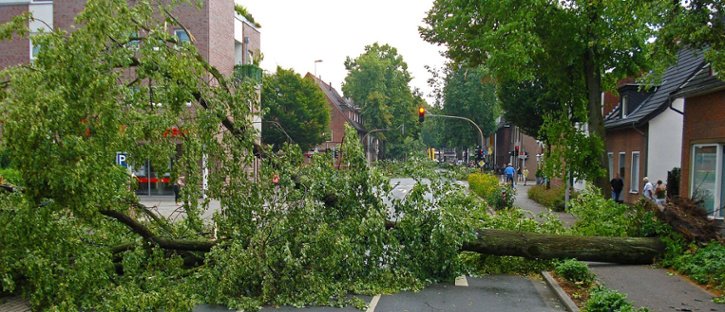

March winds and April Showers bring forth May flowers? Spring could be a little more treacherous than that popular saying might lead you to believe. Tornado season is right around the corner, from March to June, so be prepared for those March winds.
Your home is your fortress and shelter from the elements, so take care of it and make sure it can hold up against the gusty winds and storms this spring. This post will be your guide to keeping your roof over your head.
What Damage Can Be Done
No matter what kind of roof you have you may be at risk of damage. Wind damage is no joke; it only takes winds up to 50 mph to pull off loose fascia and edge flashing. Let’s take a look at some of the different kinds of damage that can be done to different roofing styles.
Asphalt Shingles: You may walk out of your home and see shingles laying on the ground outside your home; they can be completely blown off during storms or strong winds. Shingles can break or begin curling, and can even lose granulation.
Shake (Wooden Shingles): Wind damage can cause splitting or curling of the shingles. Moisture intrusion from storms can also cause mold or increased rate of decay.
Flat Roof: Wind can get underneath roofing materials and pull them up, making the roof look bumpy, and making the roof no longer securely attached. Once the wind pulls up these materials, water can get in and cause rotting. Strong gusts can also remove granules and gravel used on built-up roofs.
Tile: Improper installation of tiles can cause buckling and uplifting during high winds. Tile roofs can also be easily damaged and broken by debris that strike it during storms.
Metal: Poorly constructed metal roofs can blow off or be ripped apart by high winds. Hail and tree limbs may dent panels, damage a seam or trim, and expose the roof to moisture.
Warning Signs
When you hear those gusts of winds that rattle your house, start paying more attention. This is an indicator that you are facing high speed winds. In the case of a tornado, the common signs are a dark-greenish sky, walls of clouds or debris, large hail without rain, and loud train-like sounds.
Check your gutters. It is fairly easy to find damage done to your gutters. Look to see if they are clogged, cracked, leaking or missing some paint. If your gutters are damaged, there a good chance your roof has taken some hits as well.
Inspect the inside of your home for water damage or leaks. Look in your attic for dark spots or trails, this could be signs of roof damage. If there are any areas of light shining through, then your roof is not completely intact.
Inspect the outside of your home for obvious damage. Look for cracked, damaged or missing shingles. They can be lying on the ground, moved around lying on your roof, or in the trees nearby. Use a pair of binoculars to get an up-close look at your roof. Mold or shingle rot is another sign that you might have roof damage, it implies that moisture is getting to your roof, meaning some part of your roofing is exposed.
Ways to Prevent Damage
Frequent inspection of the interior and exterior of your home is key to keeping your roof in its best condition. Here are a few quick tips to preventing damage to your roof:
- Make sure your shingles are secured properly, with six nails or staples to hold each shingle down.
- Install a waterproof layer under the shingles to protect from moisture damage if water gets through.
- To prevent wind uplifting, securely fasten the metal edge flashing and fasten down fascia.
- Remove or trim trees that are too close to your home. If trees, branches or other debris fall on your roof they will likely cause a severe amount of damage.
- Consider switching to high-wind resistant concrete roofing, if wind damage is common in your area.
When Damage Occurs
At the first sign of any damage be sure to fix it immediately or the damage will increase exponentially. If you do find yourself with roof damage, or are looking for some help sealing up and making sure you are protected from the storm call 1-855-BONEDRY and get in contact with one of our representatives to find out how we can help you. Our roofing specialists have experience in all types of roofing, and access to the best materials on the market.
